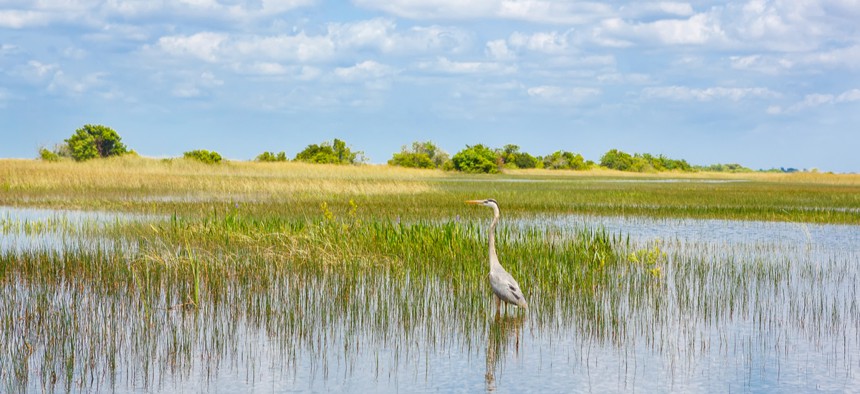Florida to Take Over Wetlands Permitting from Feds

Florida has more wetlands than any of the other 47 contiguous state. Shutterstock
It will be only the third state granted such authority. Environmentalists in Florida say the state doesn’t have the resources to assume these responsibilities.
The Trump administration last week made Florida the third state to assume control of the permitting process that determines what can be built in and around wetlands.
Environmental Protection Agency Administrator Andrew Wheeler and state government leaders say the move gives Florida scientists with greater knowledge of local wetlands more control in the process. But environmental groups counter that the state’s environmental agency isn’t prepared for the responsibility and the move will result in acceleration of the state’s wetland losses.
Typically, to build around wetlands, developers must obtain both state and federal permits if they plan to dredge or fill in the area. The U.S. Army Corps of Engineers oversees this process for the federal government, determining whether construction projects like housing developments or utility projects will have a significant impact on wetlands, which provide shelter for animals and are vital in management of floodwaters.
With the change announced by the EPA, permitting authority under the Clean Water Act Section 404—which monitors the disposal of “dredge or fill material” into wetlands and other bodies of water—will now transfer from the Corps to the Florida Department of Environmental Protection.
“This is a historic moment for our agency and our state,” said FDEP Secretary Noah Valenstein. “Our waters and wetlands are critical to our economy and way of life in Florida. As such, it is important for the state to be in charge and take the lead in their protection.”
About one-fifth of the country’s wetlands are in Florida, but the state has lost millions of acres of them in the past few decades. Dredging and filling for construction are a major source of loss, as Florida is one of the most active parts of the country for dredge and fill permits.
Hundreds of Florida residents urged the EPA not to grant Florida’s request to take over the permitting process. Many wrote to the federal agency saying they feared the state would be more friendly to developers, allowing construction in vulnerable landscapes. Those concerns were echoed by major environmental groups like the Audubon Society, the state network of Waterkeeper organizations, and Earthjustice.
When Florida first submitted its request in February, Earthjustice released a statement saying that “powerful developers and lobbyists” were behind the push, and that the Florida Department of Environmental Protection “doesn’t have the proper capacity to take over the wetlands permitting” when “it can’t even manage to enforce the environmental laws already under its purview.”
Florida is the first state in 25 years to receive approval to do the permitting process themselves. Michigan and New Jersey are the only two other states with such authority.
Wheeler said that “a considerable amount of effort” went into the transfer of power. “Federal authorities don’t delegate this type of permit often, but Florida has beyond question one of the greatest environmental records of any state, and I couldn’t be happier that Florida has shown it can meet the strict national standards EPA sets to protect human health and the environment,” he said.
The EPA said in a press release that state regulators are “generally more familiar with local aquatic resources, issues, and needs” and that a state-run program “can help reduce delays and save money for permit applicants.” Since 2018, the Trump administration has encouraged states to take over the 404 permitting process, but the transfer requires a complicated administrative process and is often controversial. Other states considering applying for this authority gave up.
Developers have long lobbied for the state to take over the process, which they complain takes too long when run by a federal agency and is redundant of similar state requirements. The switch to a state-run program will bring “more certainty to the cumbersome and lengthy permitting process, which is expected to reduce project delays and costs,” said National Association of Home Builders chairman Chuck Fowke.
Wheeler said he expects “a flurry” of other states to follow Florida, but with the change of administration next month it is unclear whether this will occur, especially given that President-elect Joe Biden has suggested he will employ a much stronger federal hand in environmental matters.
Some environmental groups in Florida are now threatening legal action or a state constitutional amendment to block the transfer of permitting powers.
“This is a parting gift to developers from the outgoing administration in Washington in coordination with the sitting administration in Florida,” said Tania Galloni, managing attorney for Earthjustice. “We’re considering our options.”
Emma Coleman is the assistant editor for Route Fifty.
NEXT STORY: New York Leaders Call for Restrictions on UK Flights






